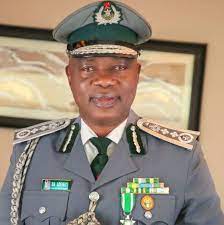
When President Bola Ahmed Tinubu appointed Bashir Adewale Adeniyi as the Comptroller-General of the Nigeria Customs Service (NCS) in June 2023, many industry watchers believed that Customs had finally got a leader who understood the system from the inside.
Two years down the line, Adeniyi has not only justified his appointment, but he has also brought a refreshing leadership style that is result-driven, innovative, and people-oriented.
One of the most significant achievements under Adeniyi’s watch is the remarkable revenue growth recorded by the service. In 2023, the NCS generated approximately ₦3.2 trillion, but by 2024, Customs revenue almost doubled to a record-breaking ₦6.105 trillion. This feat was not just a lucky break—it was the result of clear policies, a focus on blocking leakages, tightening enforcement, and expanding the digitalization of customs processes.
Even more impressive is that in the first quarter of 2025, the service already generated ₦1.3 trillion, more than double the ₦600 billion it collected in the same period in 2023. These numbers are a strong pointer to the fact that under Adeniyi’s leadership, the Customs Service has stepped into a new era of productivity and accountability.
Beyond revenue, Adeniyi has shown a strong commitment to officers’ welfare. In the last two years, the service has implemented several policies that have improved the working conditions of its men and women. From timely promotions to training and retraining of officers, from improving barracks accommodation to boosting the morale of officers on border assignments, Adeniyi has proven to be a leader who cares.
On the policy side, his administration has deepened the use of technology in Customs operations. The rollout of the Time Release Study (TRS), the strengthening of the Authorised Economic Operator (AEO) programme, and the commitment to the E-Customs project all point to a forward-thinking leadership determined to make Customs a global player. The full reopening of Nigeria’s land borders and the review of trade facilitation processes have further positioned the service as a partner in national economic growth.
Also worthy of mention is the renewed anti-smuggling campaign, which has led to several high-profile seizures and arrests. Adeniyi’s field experience has helped to refocus Customs’ enforcement units, making them more effective in tackling smuggling, especially at the borders and creeks.
The CG has also built stronger collaboration with stakeholders—freight forwarders, importers, exporters, government agencies and the media—all of whom now see the Customs Service as more open, more responsive, and more professional.
Clearly, the journey is not over. The revenue target for 2025 is now pegged at ₦6.58 trillion, a challenging figure that will test the sustainability of the reforms put in place. But if the performance so far is anything to go by, there is every reason to believe that the Customs Service under Adewale Adeniyi will not just meet expectations, but will likely surpass them.
As the CG marks his second year in office, he has already written his name in gold in the books of Nigeria Customs. But more importantly, he has shown that with the right leadership, public institutions can deliver real value to the nation.














